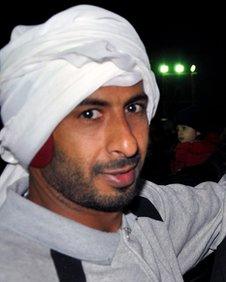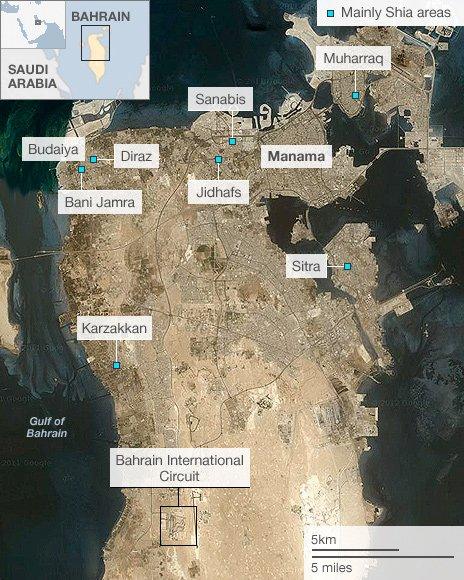Bahrain: Activist found dead ahead of Grand Prix
- Published
Human rights activist Nabeel Rajab: "We are almost in a war zone"
A man has been killed in Bahrain during overnight clashes with the security forces, activists say, a day before Sunday's F1 Grand Prix.
Officials said an investigation had been launched after his body was discovered in a Shia village near the capital, Manama.
Tens of thousands on Friday took part in at times violent protests demanding an end to the crackdown on dissent.
On Saturday, police fired tear gas to disperse new rallies, eyewitnesses say.
They say that protesters responded with petrol bombs during the clashes in Diraz, outside Manama.
Armoured vehicles are patrolling the streets of the capital ahead of the race, which the government says will go ahead.

Salah Abbas Habib's body was found on Saturday morning
The discovery of the dead body came as practice and qualifying sessions for the Grand Prix were taking place.
Mainly Shia protesters have announced "days of rage" against the race.
Formula 1's governing body, the FIA, only went ahead with the Grand Prix after the government said it had security under control.
Last year's Grand Prix was cancelled after 35 people died in February and March during a crackdown on mass demonstrations calling for greater democracy.
The protesters demand an end to discrimination against the majority Shia Muslim community by the Sunni royal family.
Human rights groups and activists estimate that at least 25 people have died since the start of the protests, many as a result of what has been described as the excessive use of tear gas.
Investigation
Activists from opposition group al-Wefaq named the man found dead on Saturday as Salah Abbas Habib, 37, and accused government forces of killing him.
An earlier unconfirmed report said the man had been found with gunshot wounds.
Chief of Public Security Major-General Tariq Al Hasan confirmed his body had been found in "suspicious circumstances" and said more details of the investigation would be released as they became available.
On Friday, Bahrain's Crown Prince, Salman bin Hamad Al Khalifa, said cancelling the Grand Prix "just empowers extremists", and insisted that holding the race would "build bridges across communities".
Jean Todt, the president of the motor racing governing body, the FIA, said he had no regrets about the race, as extensive investigations into the situation in Bahrain had unearthed "nothing (that) could allow us to stop the race".
"On rational facts, it was decided there was no reason to change our mind," Mr Todt said.
The Shia protesters say going ahead with the race lends international legitimacy to a government that is continuing to suppress opposition with violent means.
Government spokesman Fahad al-Binali says the protester's death is being investigated
'Beaten'
Al-Wefaq said security forces had beaten protesters in Shakhoura with tools and weapons, according to the AFP news agency.
The group reported on Saturday that 70 people had been injured by security forces in the past two days and 80 others arrested.
Meanwhile, the daughter of political and human rights activist Abdul al-Khawaja, who has been on hunger strike for more than two months, was briefly detained when she went to see him in hospital, Nabeel Rajab said. She was not allowed to see her father.
Mr Khawaja launched his hunger strike in protest against a life sentence handed down by a military tribunal in June.
He stopped drinking water on Thursday, according to his daughter, Zainab.
She told the BBC that on Saturday her father was in a critical state.
"He's on the 73rd day of his hunger strike and the last call he made yesterday, he asked for his lawyer to go see him so he could write his will.
"We're afraid that we might never hear of him again, and that we might not see him again."
During Friday's protests, tens of thousands people walked along a motorway from Budaiya, an area to the west of Manama.
Police fired stun grenades and tear gas at a small group who tried to reach the site of the former Pearl Roundabout, which was at the heart of the initial mass anti-government protests last year.
A prominent Bahraini activist, Mohammed Hassan, who has worked with many foreign news organisations including the BBC, has now been released after being arrested on Friday night.
